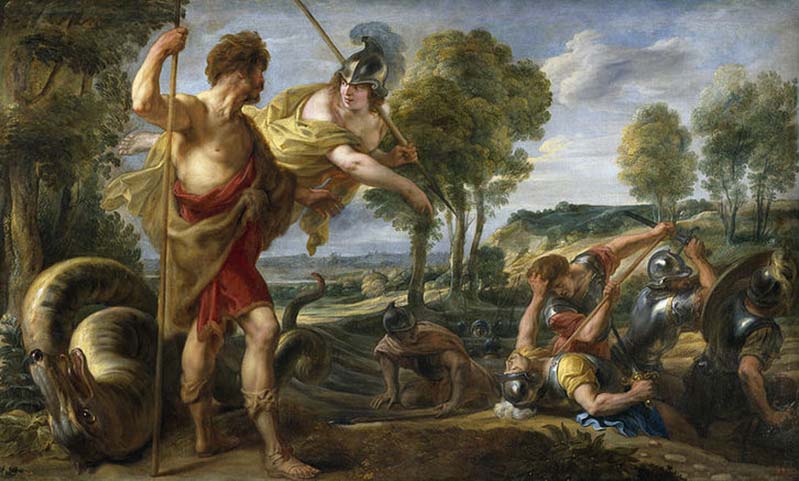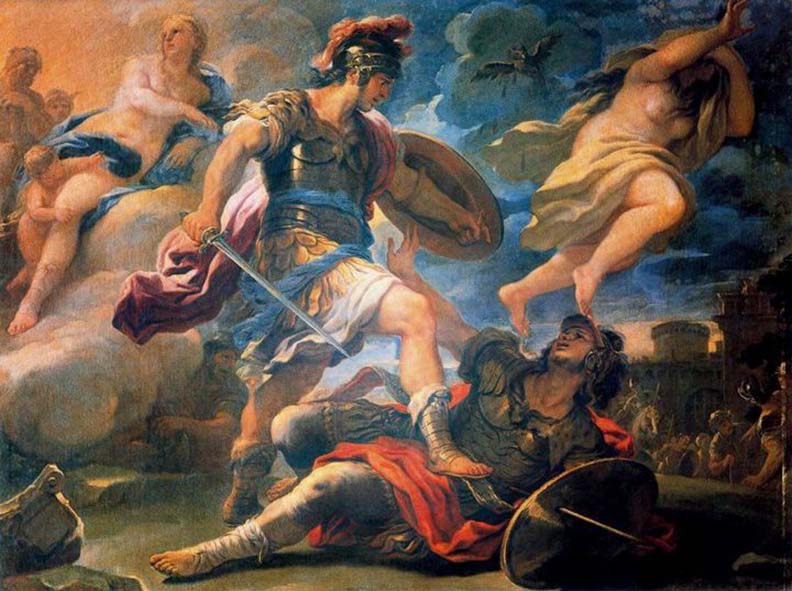Peneleus
In Greek mythology, Peneleos (Ancient Greek: Πηνελέως) or, less commonly, Peneleus (Πηνέλεος), son of Hippalcimus (Hippalmus) and Asterope, was an Achaean soldier - and one of the Achaean leaders - in the Trojan War.
The etymology of his name means the following: Πηνειός + λεώς = λαός, meaning: the people of the valley of Pinios (or Pineios - Pineios was, and still is, a large river in Greece).
Mythology
Peneleus was a Boeotian, named as a son of Hippalcmus and Asterope, and was thus through Hippalcmus, a descendent of Boeotus, the eponym of Boeotia.
Peneleus the Argonaut
In the Bibliotheca, Peneleus is named as an Argonaut. The gathering of heroes under the leadership of Jason occurred in the generation before events of the Trojan War, for the sons of many Argonauts took part in the Trojan War.
Thus, Peneleus would be a contemporary of Nestor, and of relatively advanced age, and yet Peneleus was active upon the battlefield of Troy.
Potentially therefore the Argonaut might have been not the son of Hippalcimus, but of Hippalmus instead.
Peneleus, the Suitor of Helen
As Peneleus is named in the Fabulae and Bibliotheca as a Suitor of Helen it suggests that Peneleus was not of an advanced age at that time, for the other Suitors were generally of a youthful age.
Peneleus was of course not the successful Suitor of Helen, for Menelaus was chosen, but Peneleus would be bound by the Oath of Tyndareus.
Peneleus probably thereafter married, for it was said that Peneleus became father of Opheltes, although the mother of Opheltes goes unnamed.
Peneleus succeeds Thersander
When the Trojan War came around Peneleus was named amongst the Boeotian contingent. In Homer’s Catalogue of Ships, 50 ships of Boeotians gather at Aulis, but these are under the leadership of Thesander, the King of Thebes. Other lists tell of Peneleus bringing 12 ships to Aulis, perhaps as a proportion of Thersander’s 50. Nevertheless, Peneleus was named as a Boeotian leader, and also an Achaean leader at Troy.
Peneleus would become the leader of the Boeotian forces at Troy, for Thersander died before the Achaeans landed at Troy. The Achaean’s would mistakenly land upon Mysia and in a battle there, Thersander was killed by Telephus, son of Heracles.
At the time, Thersander’s son, Tisamenus, was too young to fight at Troy, and so Peneleus was elevated to leader, and it was also said that Peneleus became regent of the city of Thebes until Tisamenus came of age.
During the fighting at Troy, Homer would tell of Peneleus killing two named Trojan defenders, killing Ilioneus with a spear through the eye, and killing Lyco with a sword, that virtually decapitated the Trojan.
The End of Peneleus
There is disagreement about the fate of Peneleus at Troy, for Pausanias, tells of his demise at Troy, in a time after the death of Achilles; Peneleus falling at the hands of Eurypylus, the son of Telephus, who led an army of Mysians to defend Troy.
Others tell of Peneleus being present during the Sacking of Troy, for he was present inside the belly of the Wooden Horse that was brought by the Trojans into their city.
In the latter case, then Peneleus survived the war, returning to Thebes, to act as regent for Tisamenus.
The Descendants of Peneleus
The descendants of Peneleus would gain far more elevated status though, for the rule of the descendants of Cadmus came to an end when Autesion, son of Tisamenus, was advised by an Oracle to depart from Thebes.
It was then decided that Damasichthon, son of Opeheltes, and thus grandson of Peneleus would become the new king of Thebes. Damasichthon was succeeded by his own son Ptolemy, and after the death of Ptolemy’s son, Xanthus, Thebes turned their back on a monarchy system of government.

Sources
Diodorus Siculus, Bibliotheca historica 4.67.7
Hyginus, Fabulae 97
Pseudo-Apollodorus, Bibliotheca 1.9.16
Pseudo-Apollodorus, Bibliotheca 3.10.8
Homer, Iliad 2.494
Pausanias, Graeciae Descriptio 9.5.15
Hyginus, Fabulae 114
Homer, Iliad 14.489
Homer, Iliad 16.340
Homer, Iliad 17.597–600
Dictys Cretensis, Trojan War Chronicle 4.17
Pausanias, Graeciae Descriptio 9.5.16
"Greek Legends and Myths"













